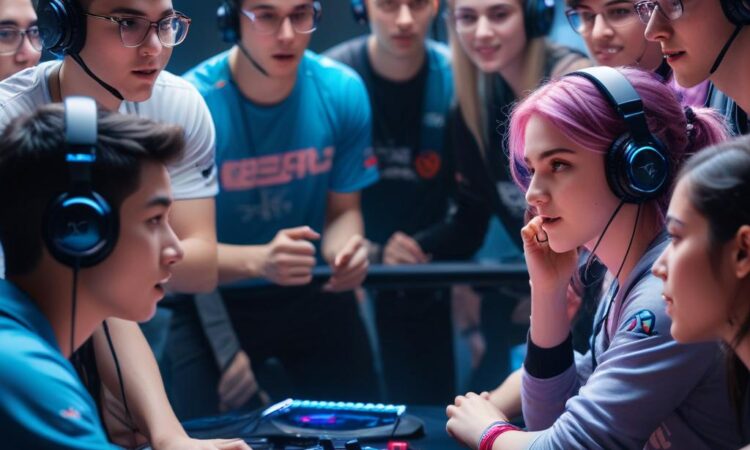Diversity and Inclusion in Esports: Breaking Down Barriers
The world of esports has exploded in popularity, captivating audiences and generating massive revenue. But despite its rapid growth, the industry faces a critical challenge: a lack of diversity and inclusion. While esports offers a thrilling and accessible platform for gamers of all backgrounds, systemic barriers continue to prevent full participation from underrepresented groups. This article delves into the ongoing efforts to promote diversity and inclusivity in esports, exploring initiatives aimed at encouraging participation from marginalized communities and fostering a more equitable and welcoming environment.
The Importance of Diversity and Inclusion
The importance of diversity and inclusion in esports extends beyond mere representation. A truly diverse and inclusive esports ecosystem fosters creativity, innovation, and a broader range of perspectives. This translates to a richer and more engaging experience for both players and viewers. Furthermore, embracing diversity and inclusivity strengthens the esports community, fostering a sense of belonging and ensuring that everyone feels valued and respected.
Benefits of a Diverse Esports Landscape
- Enhanced Creativity and Innovation: A diverse range of perspectives and experiences leads to unique and innovative approaches to gameplay, content creation, and overall esports development.
- Broader Audience Appeal: By reflecting the diverse demographics of its audience, esports becomes more relatable and appealing to a wider range of individuals, increasing viewership and fan engagement.
- Stronger Community: A sense of belonging and inclusion fosters a more positive and welcoming environment for all participants, encouraging healthy competition and collaboration.
- Business Advantage: A diverse and inclusive esports ecosystem attracts sponsors and investors seeking to tap into a broader and more engaged market.
Addressing the Barriers to Participation
While esports holds the potential to be a truly inclusive space, several barriers prevent full participation from underrepresented groups. These barriers include:
Financial Barriers
The cost of entry into esports can be prohibitive for many, particularly those from low-income backgrounds. This includes the cost of gaming equipment, internet access, tournaments fees, and travel expenses. Without adequate financial resources, aspiring esports players may struggle to compete at a professional level.
Lack of Representation and Role Models
The lack of representation of women, people of color, and LGBTQ+ individuals in professional esports creates a sense of exclusion and discourages participation from these groups. Seeing successful role models from diverse backgrounds is crucial for inspiring the next generation of esports athletes.
Cultural and Language Barriers
Esports tournaments and events are often conducted in English, which can pose a barrier for individuals from non-English speaking backgrounds. Language barriers can also affect communication within teams and with fans, making it harder for players from diverse cultures to fully integrate into the esports community.
Discrimination and Harassment
Unfortunately, online gaming environments are often plagued by discrimination and harassment. Toxic behavior, including verbal abuse, threats, and even physical violence, can create a hostile and unsafe environment for marginalized players, discouraging their participation.
Initiatives for Promoting Diversity and Inclusion
Recognizing the challenges, various initiatives are being implemented to promote diversity and inclusivity in esports. These initiatives aim to break down barriers, encourage participation from underrepresented groups, and create a more equitable and welcoming environment for all.
Scholarship Programs
Several organizations offer scholarships to help aspiring esports players from underrepresented backgrounds overcome financial barriers. These scholarships can cover the costs of equipment, training, tournament fees, and travel expenses.
Mentorship Programs
Mentorship programs connect aspiring esports players with experienced professionals who can provide guidance, support, and networking opportunities. These programs help new players develop their skills, navigate the esports industry, and build confidence.
Diversity and Inclusion Training
Organizations are increasingly implementing diversity and inclusion training programs for their employees, players, and fans. These programs educate participants on the importance of respectful communication, cultural sensitivity, and creating inclusive environments.
Community Outreach Programs
Esports organizations are reaching out to communities underrepresented in the industry to promote participation. These programs often involve hosting gaming events, workshops, and tournaments in underserved areas, fostering a love for esports and providing opportunities for aspiring players.
Accessible Gaming Platforms
The development of accessible gaming platforms and controllers enables individuals with disabilities to fully participate in esports. These platforms use adaptive technologies that allow players with physical impairments to control games with ease.
Positive Developments and Future Goals
While significant progress has been made in promoting diversity and inclusion in esports, much work remains to be done. The industry is witnessing positive developments, including increased representation of women and people of color in professional esports, more accessible gaming platforms, and greater emphasis on fostering inclusive environments. However, continued efforts are needed to address the challenges and ensure that esports truly reflects the diversity of its audience.
Looking ahead, the future of esports hinges on its ability to embrace diversity and inclusion. By fostering a welcoming and supportive environment for all players, the industry can reach its full potential, attracting a broader audience, generating more revenue, and creating a more equitable and engaging gaming experience.
Conclusion
Diversity and inclusion are not just buzzwords in esports; they are essential for the industry’s long-term success. By breaking down barriers, fostering participation from underrepresented groups, and creating a more inclusive environment, esports can become a truly global phenomenon, reflecting the diversity of the world and captivating audiences of all backgrounds.

